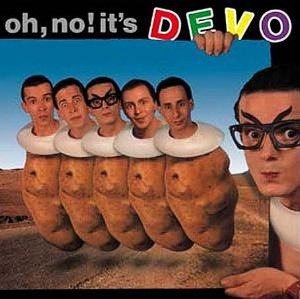
Oh No! It's Devo by Devo (1982)
As a teenager back in the mid 1980s, I had a next-door neighbor about my age that owned a copy of Devo's Oh No! It's Devo. Since my siblings and I were frequent visitors at his house, it turned out that we listened to this rather bizarre album on a very regular basis. One of our favorite activities was to turn off the standard lights in his room, and then to switch on the "dancing lights," which in this case were a set of perennial sparkling Christmas lights, a lava lamp, a few black lights, and several multi-colored light bulbs. There was even a strobe light that would be turned on from time to time. With songs from Devo blasting away at full volume, we would intentionally dance in the most uncool ways imaginable. Devo was a kind of relief for me, and maybe for my friends as well, because they gave us a welcome break from the usual teenage peer pressures. We could be as dorky and as nerdy as we liked, and there was nobody in that room who cared to pass judgment on us for it. Surprisingly, some of our supposedly "ultra-cool" acquaintances showed up for one or two Devo dance parties and even they were compelled to give in to the irresistible urge to surrender themselves to the mechanical Devo beat and dance like complete fools. I think that's the secret power that Devo has -- the ability to get their listeners to at least temporarily give up their unexamined inhibitions and to embrace the inner weirdness and quirkiness that we subconsciously suppress.
Looking back at that time in music, it seems clearer now that Devo's sound was in very large part a focused reaction against the phony and pretentious idea of coolness that had crept into rock and had finally started to overwhelm it. By 1982, the time was definitely ripe for some major backlash against the usual musical fare. Devo -- which began as a punk-rock act and morphed into, well, the Devo of "Whip It" -- was just one of several musical acts in the early 1980s, such as Thomas Dolby, Men Without Hats, and Wall of Voodoo, that had some mainstream success by abandoning the usual electric-guitar-heavy, sex-symbol, rock-and-roll-god approach with Robert-Plant-style vocals and typical bohemian lyrical fare, and by replacing it with its complete antithesis, namely, a synthesizer-based sound, conceptual art-deco fashion, a robotic singing style, an emphasis on parody and irreverence, and a determined nerd vibe meant as a pointed repudiation of the established ideas at the time regarding coolness in popular music. During those years, it seemed to me that if you didn't "get" Devo, it meant that you were way too sold on the idea of conforming to the predominant expectations of popular culture. Sure, I liked Led Zeppelin as much as anyone else, but I needed a good dose of Devo every now and then to even things out. I think that we all did, whether we were able to admit it or not.
So much about Devo is singular and odd. Even almost thirty years after the release of Oh No! It's Devo, the intense strangeness of the album still puts it in a category all by itself.
We can start with the album cover. The members of the group stare back at you with their computer geek haircuts. The expressions on their faces are intensely dorky. Their bodies have been turned into precisely identical potatoes. Beneath their heads are their white "spud ring" collars. Their potato bodies float above some dull dirt road in the middle of what appears to be the high plains of the Midwest USA. These images are contained within a picture, which is held up by lead singer Mark Mothersbaugh, who wears thick, black horn-rimmed glasses above which are suspended fake eyebrows that evilly slant downwards. The overall impact of the album cover is to cause the viewer to ask him or herself: "What the hell is this?" The answer? It sure isn't REO Speedwagon.
The music isn't exactly timeless. If you'd never heard the album before, and somebody played ten seconds from any of the songs on it, this would be more than enough for you to say: "Hey, that band is from the 1980s." Sure, just like a lot of bands of the era, they got into the recently popularized electronic drum beat and cheesy synthesizer sounds that came to define the decade. However, Devo used those sounds in ways that were uniquely their own.
The most interesting songs from the album are the following:
"Time Out for Fun" Is this song for kids? Is it for adults? Is it for kids that feel like adults or for adults that feel like kids? Or both? The big taboo that Devo breaks on this album, on this and on other songs, is to create tunes that don't seem to be directed at any specific demographic. Heaven forbid that they should create a somewhat naughty album that might appeal as much to kids as to adults. Maybe "heaven" did forbid it, but Devo did it anyway. The official video shows Devo bouncing around like kids, and the chorus with pompous timpani drums sounds like something you might hear at a Chucky Cheese restaurant, but in the background you have a few disturbing and violent images presented in an abstract and desensitized way, followed by some zany slapstick humor. How should this be interpreted? How about as postmodernist farce? That's my best guess.
"Peek-a-boo" The genius of "Peek-a-boo" is to take a simple toddler's game and to turn it into a scathing indictment of adult hypocrisy. If you are young and innocent and hear the chorus (peek-a-boo, I can see you, and I know what you do, because I do it too), you might think nothing of it, because you have nothing to hide. If you are a bit older, however, you can probably come up with a pretty big list of stuff you'd prefer to keep private. The berserk synthesizer, which approximates the sound of an alarm warning at a nuclear reactor, seems to be alerting the Devo-appointed authorities to come and arrest you for being a phony.
"She's Out of Sync" Lyrically, I find this one of the most interesting songs on the album. What's wrong with the girl described in the song? Is she mentally ill or just ideologically maladjusted? Or both? "She's out of orbit, she'll never connect." Actually, I think this is the perfect soundtrack for Ann Coulter's life. It also suits several women I've personally known over the years. They probably feel the same way about me.
"We Like Explosions" This is a rocking party song if ever there was one. The entire tune is one big hook. Left speaker squeaky nerd voice: Yes! Right speaker huge pro wrestler voice: Oh yeah! Up the middle chorus: We like explosions! The synthesizer sounds are as freaky as they come. What kinds of explosions are they talking about? There seems to be some innuendo in there. Maybe he's trying to say that people who love action movies with lots of explosions are subconsciously associating them with something else, if you get my drift.
"Speed Racer" This is really the funniest song on the album, although I'm not sure if Devo necessarily meant for it to be. For years I racked my brains trying to figure out what the collection of characters collectively means. There is the well-known Japanese cartoon character Speed Racer, a pirate, a Barbie doll, and a doctor, all done with convincing voices for each character, each of which rhythmically speaks his/her lines in a manner more suited to a children's television program than to a typical pop song. What do they have in common? What's the point? Devo would get an F from the typical high school English teacher for that one, but they get an A+ from me. Speed Racer says: "I drive real fast, I'm going to last." The pirate says: "I'm a big pirate and I like to drink, I like to steal and I like to kill." Then he laughs a typical big, hearty pirate laugh for the kiddies. Barbie says: "I'm a Barbie doll and I've got brains and I like sex." The doctor says: "I like to steal so here's your bill." After years of careful reflection, I think I may have deciphered the interpretive code for this song. Here goes. These are all characters embraced by children everywhere, but if you take a deeper look at what they signify, you have to question whether or not that's such a good idea. Do we want our kids to grow up to drive like Speed Racer? Will they "last" like he does if they drive that way? Do we really want to encourage our children to celebrate pirates who drink, steal, and kill? How would we feel if our little girls turned out to be like Barbie dolls? Is growing up to be a doctor always really such a great thing?
Admittedly, this album is not for everyone. If you can't handle over-the-top conceptual strangeness, you probably won't like it. But if you like a good joke, enjoy celebrating your inner geek, and feel like getting into a weird vibe, Devo delivers the goods. It's a great party album, provided that Devo-friendly people have showed up at your house.
Reviewed by Somebody Else 2/1/11
See more Favorite Albums of the Moment





